Empower Yourself with This Essential Guide
As someone who loves exploring new places, I’ve had my fair share of adventures around the world. I’ve traveled solo through Aruba, wandered the beautiful beaches of Bali, and recently, tackled an exciting trip to South Africa. But before I went, I had the same question that many women ask: Is South Africa safe for solo female travelers? It’s a stunning country with its diverse landscapes, rich culture, and vibrant cities, but stories about crime can make anyone a little nervous. So, I did my homework, prepared for any challenges, and packed my bags with a mix of excitement and caution.

In this post, I want to share my honest experience as a solo female traveler in South Africa, just as I did during my trips to Aruba and Bali. While safety is always top of mind, I believe with a little planning, awareness, and trust in your instincts, it’s possible to have an incredible time in South Africa. Whether you’re interested in Cape Town’s iconic Table Mountain, a safari at Kruger National Park, or the scenic beauty of the Garden Route, this country has so much to offer. Let me walk you through the places I visited, the precautions I took, and some helpful tips for staying safe, so you can decide if South Africa should be next on your solo travel list.
Table of Contents
Understanding the General Safety Landscape in South Africa
Before diving into specific tips for women’s safety in South Africa for solo travel, it’s important to understand the overall safety landscape of the country. South Africa has a well-documented issue with crime, but the reality is more nuanced, especially for tourists. As in many countries, crime hotspots exist, but so do safe and enjoyable areas, particularly for tourists who exercise caution.
Crime Rates in South Africa: What to Know
South Africa does have high crime rates, particularly in certain urban areas like Johannesburg and Pretoria. Petty theft, such as pickpocketing and bag snatching, is common, especially in crowded tourist spots. More serious crimes like robbery or assault can occur, but these are rarer in tourist-centric areas where security measures are tighter.
That said, solo female travelers must be aware of their surroundings and avoid unsafe areas, particularly after dark. According to Numbeo, a crowd-sourced database of global living conditions, South Africa ranks high in terms of perceived crime, but these numbers can be misleading without understanding where the data comes from. Many of the crimes reported occur in areas far from the popular tourist districts.
Tourist Safety vs. Resident Safety
There’s often a significant difference between the crime risks faced by residents and those faced by tourists. Tourist areas like Cape Town, the Garden Route, and Kruger National Park are typically much safer due to heavy police presence and well-maintained infrastructure.
As a solo female traveler, it’s also worth noting that local cultural norms might impact how you’re perceived. Women traveling alone may receive extra attention, but this is often out of curiosity rather than ill intent. By staying in well-populated areas and following basic safety precautions, you can significantly reduce your risk.
Is South Africa Safe for Solo Female Travellers?
Now, let’s address the central question: Is South Africa safe for female tourists? The short answer is yes—traveling alone in South Africa as a woman is possible and can be safe, but with caveats. Safety depends largely on where you go, how you behave, and the precautions you take.
Personal Safety Concerns for Female Travellers
Safety tips for solo female travelers in South Africa revolve around a few key areas:
- Harassment: While serious gender-based violence exists, it’s more commonly directed at local women. As a tourist, you’re more likely to experience verbal harassment or unwanted attention, especially in busy urban areas. Dressing modestly and being assertive can often deter this.
- Pickpocketing and Theft: Keep your belongings secure. Use anti-theft bags, and avoid wearing expensive jewelry or flashing large amounts of cash. It’s better to use discreet money belts or concealed pouches.
- Scams: Be wary of overly helpful strangers offering unsolicited advice or “tour guide” services, as these could be scams to overcharge or steal from tourists.
By keeping your wits about you and following South Africa safety advice for solo female travelers, you’ll significantly improve your travel experience.
Recent Trends and Reports
Recent data shows that many solo female traveler experiences in South Africa have been positive, especially in safer regions like Cape Town and along the Garden Route. In fact, South Africa has seen a growing number of female travelers in recent years, and as more people share their positive experiences, the country’s reputation for solo female travel continues to improve.
Safest Cities and Regions in South Africa for Solo Female Travellers
When considering safe places in South Africa for solo female travelers, it’s essential to know which areas offer the best combination of security and attractions. South Africa is vast and diverse, so the safety levels can vary significantly from one region to another. Below, we’ll break down the best destinations in South Africa for solo women, focusing on areas that are not only rich in culture and beauty but also safer for travelers.
Cape Town: A Safe Haven for Solo Travelers
Cape Town is often regarded as one of the safest cities in South Africa for tourists. With its stunning beaches, the iconic Table Mountain, and vibrant neighborhoods like Bo-Kaap and Camps Bay, this city is a must-visit for any traveler. It also offers a well-developed tourism infrastructure, making it easier for solo female travelers to explore safely.
- Safest neighborhoods: Look for accommodations in areas like Sea Point, Green Point, and Camps Bay. These areas are well-lit at night and frequented by tourists, offering a good balance of safety and convenience.
- Key safety tips: Stick to busy areas, especially at night. Use rideshare services like Uber rather than walking long distances after dark.
Cape Town also has excellent transport links, making it easier to get around. However, always use reputable transport options like Uber, and avoid public transport like minibuses, which are often unsafe for tourists.
Johannesburg: What to Know Before You Go
Johannesburg, or Joburg, has a reputation for being less safe than Cape Town, and in many ways, this is true. However, this bustling city can still be an exciting destination if you take precautions. Areas like Sandton and Rosebank are relatively safe and cater to tourists.
- Safer districts for tourists: Sandton, known for its high-end shopping and hotels, is considered safer than many other areas in Johannesburg. Rosebank is also a good choice for tourists, offering a blend of safety and culture.
- Safety tips: Avoid walking alone at night, especially in less populated areas. Instead, use a reputable taxi service or rideshare app for transportation.
Durban: Is It Safe for Solo Female Travellers?
Durban, a coastal city with a unique blend of Zulu culture and stunning beaches, is a fantastic destination for solo female travelers. Although not as popular as Cape Town or Johannesburg, Durban is relatively safe, especially in tourist-centric areas.
- Safe neighborhoods: Look for accommodations in Umhlanga Rocks, an upscale area popular with tourists, or North Beach, a well-frequented spot.
- Safety tips: Stick to the well-known tourist areas and beaches. It’s advisable to avoid walking along the beach at night and to use transportation instead.
The Garden Route: A Peaceful Escape
For a more serene and scenic experience, the Garden Route is one of the best choices for solo female backpacking in South Africa. This 300-kilometer stretch along the southeastern coast is renowned for its stunning views, charming towns, and abundant outdoor activities like hiking and whale watching.
- Best towns to visit: Knysna, Plettenberg Bay, and Wilderness are all popular stops along the Garden Route, offering a balance of natural beauty and safety.
- Safety tips: The Garden Route is generally safer than the big cities, but it’s still important to be cautious in more isolated areas. If hiking or exploring, inform someone of your plans and always carry a mobile phone.
Kruger National Park and Other Safari Destinations
If you’re interested in wildlife, Kruger National Park is one of the most popular destinations for solo travelers. The park itself is very safe, as it is heavily guarded and tourists are generally accompanied by guides or staff.
- Safari safety: Stick to organized tours or guided safaris. Walking alone in or near the park is not recommended for safety reasons.
- Accommodation safety: Safari lodges in and around the park are well-secured, but it’s still important to follow safety instructions, especially regarding wildlife.
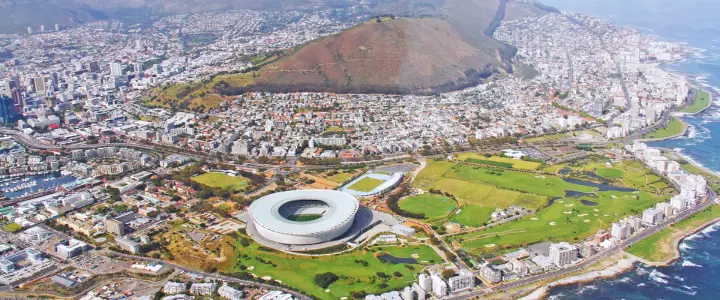
Cape Town
Arguably one of the most iconic cities in the world, Cape Town is a dream for solo female travelers. With its dramatic landscapes, including Table Mountain and Cape Point, Cape Town is full of stunning sights and diverse neighborhoods to explore. Tourist-friendly areas like Camps Bay, V&A Waterfront, and Kalk Bay are generally safe and have a strong police presence. However, like any big city, it’s important to remain vigilant, especially in quieter areas after dark.
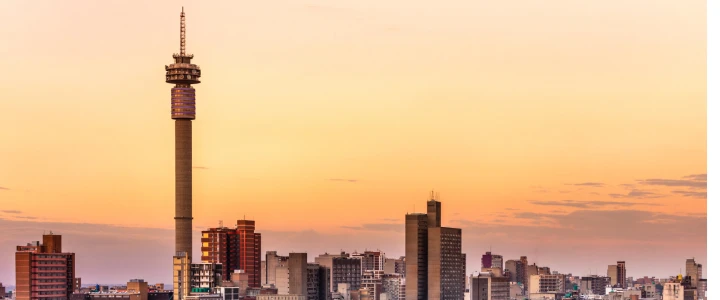
Johannesburg
As South Africa’s largest city, Johannesburg is a bustling metropolis with a rich history and vibrant culture. While the city has a reputation for higher crime rates, areas like Sandton and Rosebank are safer for tourists, with plenty of secure accommodations and dining options. Solo travelers should be cautious, avoid walking alone at night, and use registered taxis or rideshare apps to get around. Visiting museums like the Apartheid Museum can provide a deeper understanding of South Africa’s history.
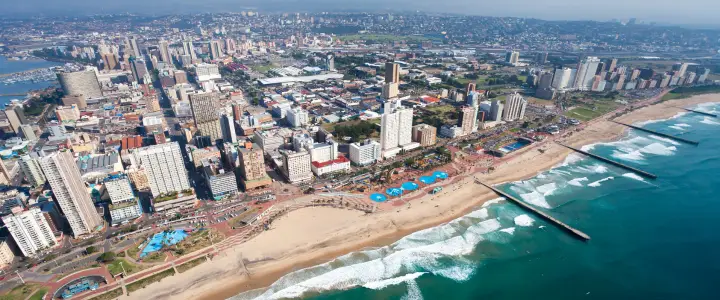
Durban
Located on South Africa’s east coast, Durban is known for its warm weather, beautiful beaches, and blend of African, Indian, and colonial influences. The Golden Mile beachfront promenade is a popular spot for tourists, and while it’s generally safe during the day, it’s wise to stay in busy areas and avoid venturing out alone at night. Durban also offers access to cultural experiences, like the bustling Victoria Street Market, and day trips to nearby nature reserves.
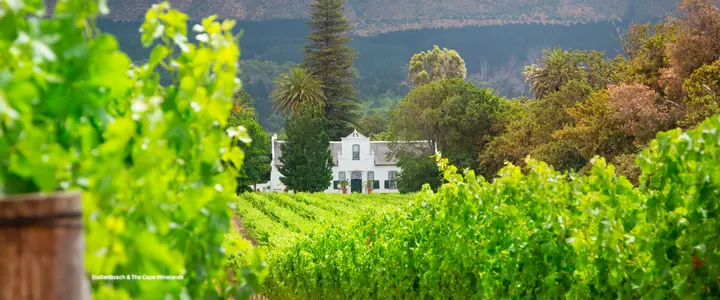
Stellenbosch & The Cape Winelands
Known for its breathtaking vineyards and historic architecture, Stellenbosch offers a peaceful escape from the hustle and bustle of city life. Located just an hour from Cape Town, the Cape Winelands are perfect for solo female travelers who enjoy nature, wine tasting, and charming small towns. The area feels relatively safe, especially in the well-trodden tourist spots. Joining a guided tour to visit the vineyards ensures safety and makes it easy to meet other travelers.
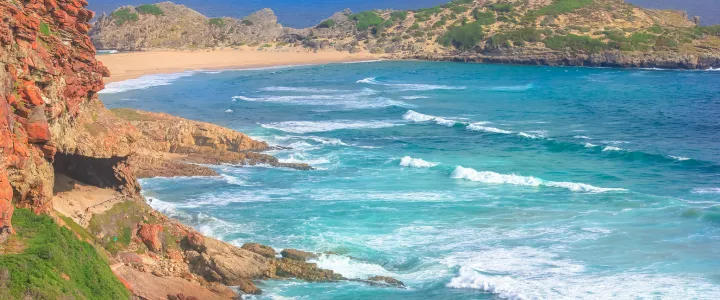
Plettenberg Bay
A gem along the Garden Route, Plettenberg Bay is known for its golden beaches, wildlife reserves, and laid-back atmosphere. It’s a fantastic destination for solo female travelers who enjoy both relaxation and adventure. You can explore nature reserves, take whale-watching trips, or simply soak in the sun. With a welcoming vibe and plenty of tourists around, Plettenberg Bay is considered one of the safer spots in the region.
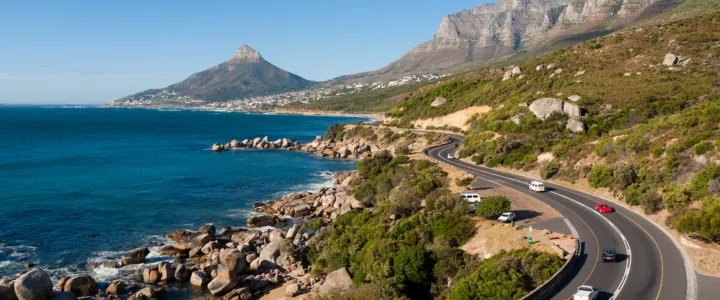
The Garden Route
Stretching along the southeastern coast of South Africa, the Garden Route is a scenic drive through forests, lagoons, and rugged coastline. It’s a favorite among solo female travelers for its stunning beauty and well-established tourist infrastructure. Towns like Knysna and Wilderness offer plenty of outdoor activities like hiking, kayaking, and beach walks. The route is generally safe, but it’s best to avoid isolated areas after dark and stick to popular tourist spots.
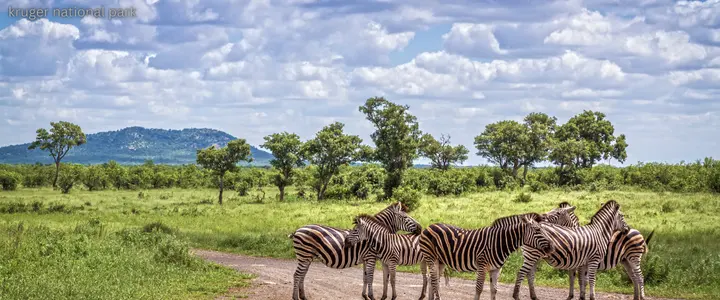
Kruger National Park
If you’re a nature lover and dream of seeing Africa’s Big Five, Kruger National Park is a must-visit. Spanning over 7,500 square miles, it offers some of the best wildlife experiences in the world. Solo travelers can opt for guided safaris, which not only enhance your safety but also provide expert insight into the animals and their habitats. While remote, Kruger is generally considered safe for tourists, with most lodges and camps prioritizing security.
Practical Safety Tips for Solo Female Travellers in South Africa
As a solo female traveler, safety comes first. Being aware of potential risks and taking simple precautions can make your experience in South Africa far safer and more enjoyable. Below are some crucial precautions for solo female travelers in South Africa:
Accommodation Safety
- Book reputable places: Stick to well-reviewed hotels, hostels, or Airbnbs with strong security measures like 24/7 staff, secure locks, and surveillance cameras.
- Check reviews: Platforms like Booking.com or TripAdvisor can help you find reliable places where other solo female travelers have had positive experiences.
- Stay in secure areas: Focus on safer neighborhoods, especially in big cities. Cape Town’s Camps Bay or Johannesburg’s Sandton are excellent choices.
Transportation Tips for Staying Safe
- Use ride-hailing apps: Services like Uber or Bolt are widely available and are safer than public minibuses. Avoid using unlicensed taxis or public buses, especially in larger cities.
- Renting a car: For more independence, renting a car is a good option. However, avoid driving at night and keep doors locked while driving in urban areas.
- Long-distance travel: If you’re traveling between cities, consider domestic flights or long-distance buses from reputable companies like Greyhound.
How to Stay Safe When Out and About
- Daytime vs. nighttime safety: It’s safer to explore during the day, especially in less crowded areas. After dark, it’s best to stay in well-lit, busy places.
- Keep your belongings safe: Use anti-theft backpacks, keep valuables like passports and wallets out of sight, and be aware of your surroundings in crowded areas.
- Trust your instincts: If something feels off, leave the area or seek help from a local establishment or the police.
Blending In and Avoiding Unwanted Attention
- Dress modestly: While South Africa is relatively liberal, dressing modestly can help you blend in and avoid unwanted attention, especially in more conservative areas.
- Be confident and assertive: If you encounter unwanted attention, be assertive but polite. Simply saying “No, thank you” or “I’m not interested” often works to deter unwanted advances.
Emergency Contacts and Resources
- Emergency numbers: Dial 10111 for police assistance and 112 for medical emergencies.
- Embassy contacts: It’s a good idea to have your country’s embassy contact details handy.
- Travel apps: Apps like Smart Traveller and TripWhistle can help you stay informed and safe by providing up-to-date information and emergency contacts.
Common Scams and How to Avoid Them in South Africa
While South Africa is full of welcoming locals and honest businesses, like many tourist destinations, it has its share of scams. Below are some common scams and how safe South Africa is for women traveling alone in this context:
ATM and Card Skimming Scams
One of the most common scams in South Africa involves ATMs and card skimming.
- Tips to avoid this: Always use ATMs located inside banks or shopping malls rather than street-side ATMs. Cover your PIN when entering it, and if the ATM seems suspicious, avoid using it.
Fake Taxi or Ride-Hailing Scams
While Uber and Bolt are safe options, some scammers may try to pose as legitimate drivers.
- How to avoid: Always check the license plate and driver photo on the app before getting in. If the driver seems suspicious or doesn’t match the app information, cancel the ride.
Tourist Overpricing
This is common in tourist hotspots, where vendors may try to overcharge.
- Tip: Always negotiate prices before committing, especially for services like taxis or tours. It’s helpful to research average prices beforehand so you know what to expect.
Health and Wellness Tips for Solo Female Travellers
Maintaining your health and wellness while traveling is just as important as staying safe. Below are tips to ensure you remain healthy during your trip.
Staying Healthy While Traveling in South Africa
- Vaccinations: Make sure you’re up-to-date on standard travel vaccinations such as Hepatitis A, B, and Typhoid. Check with a travel clinic before departure.
- Water safety: Tap water is generally safe in cities like Cape Town and Johannesburg, but it’s advisable to drink bottled water in rural areas.
- Food safety: South Africa’s food is delicious, but avoid street food vendors with questionable hygiene. Stick to reputable restaurants and always wash your hands or use sanitizer before eating.
Access to Healthcare and Pharmacies
South Africa has modern healthcare facilities in major cities, so if you fall ill, there are good hospitals available.
- Pharmacies: Pharmacies are common in larger cities, and many offer a range of over-the-counter medications. It’s still wise to bring a small first-aid kit with essentials like band-aids, painkillers, and any prescription meds you may need.
Mental Health and Solo Travel
Solo travel can sometimes feel lonely, especially in a foreign country.
- Tips to manage loneliness: Stay connected with friends and family via video calls or social media. Consider joining travel groups or staying in hostels where you can meet other solo travelers.
Reviews from Other Solo Female Travellers: Real-Life Experiences
Nothing beats learning from those who have done it before. Below are real solo female traveler experiences in South Africa, offering insights into how they managed to stay safe and enjoy their trip.
Case Study 1: Rachel’s Journey Along the Garden Route
Rachel, a solo traveler from the UK, shared her positive experience backpacking along the Garden Route. She emphasized the importance of staying in hostels where she could meet other travelers and always informing someone of her plans before embarking on hikes.
“I felt safe in most areas, especially along the Garden Route. I made sure to stick to busy areas and avoided walking around at night. The key for me was preparation and awareness, and I had a fantastic experience.”
Case Study 2: Marie’s Cape Town Adventure
Marie, a solo traveler from Canada, explored Cape Town for two weeks and shared some of her insights:
“Cape Town felt surprisingly safe, especially in areas like Camps Bay and V&A Waterfront. I did my research beforehand and booked accommodations in areas with high security. I loved every minute of my trip, and I’d definitely recommend it to other solo female travelers.”
Final Thoughts: Is South Africa Safe for Solo Female Travellers?
So, is it safe for women to travel solo in South Africa? The short answer is yes! With the right precautions and a little common sense, South Africa can be an incredibly rewarding destination for solo female travelers. While the country does have its challenges, many women have enjoyed their travels here and have stories to tell about the unforgettable experiences they had.
To ensure a safe and enjoyable trip, it’s essential to do some careful planning before you go. Start by researching the areas you plan to visit and identify safe regions where other travelers have had positive experiences. Popular tourist destinations like Cape Town, Durban, and the Garden Route typically offer a welcoming atmosphere and have a strong tourist infrastructure. These areas often have a visible security presence, which can help you feel more secure as you explore.
Following basic South Africa safety advice for solo female travelers is crucial. Always stay alert, especially in crowded areas or when using public transportation. It’s wise to avoid walking alone at night and to steer clear of less populated neighborhoods. Opt for registered taxis or reputable rideshare services like Uber to navigate the cities. Additionally, keeping your belongings secure and being mindful of your surroundings can go a long way in ensuring your safety.
Perhaps most importantly, always trust your instincts. If something feels off or makes you uncomfortable, don’t hesitate to change your plans. Engage with locals and fellow travelers, as they can provide valuable insights into safe practices and areas to avoid. With a little caution and preparation, you can immerse yourself in South Africa’s breathtaking landscapes, rich culture, and warm hospitality, creating memories that will last a lifetime.
FAQs
1. Is it safe to walk at night in Cape Town?
Walking at night in Cape Town requires caution. While some areas, especially tourist hotspots like the V&A Waterfront and Camps Bay, are generally safe after dark, it’s best to avoid walking alone in less populated areas or neighborhoods that you are unfamiliar with. Always stay aware of your surroundings and consider using rideshare services or taxis to navigate the city at night.
2. What to avoid in Johannesburg?
In Johannesburg, it’s wise to avoid isolated areas and certain neighborhoods known for higher crime rates. Stay away from empty streets and be cautious in places like Soweto unless you’re on a guided tour. Keep your belongings secure, don’t display valuables, and avoid walking alone at night. Trust your instincts and seek advice from locals or hotel staff about safe areas.
3. What is the safest city in South Africa?
Cape Town is often regarded as the safest city in South Africa for tourists. While it still has areas with crime, popular tourist destinations like Camps Bay, Clifton, and the V&A Waterfront are generally safer for visitors. Durban and Stellenbosch also rank highly for safety among travelers.
4. Is Johannesburg safe for white tourists?
Johannesburg is generally safe for all tourists, including white travelers, but it does have areas with higher crime rates. All visitors need to stay vigilant, avoid displaying wealth, and adhere to safety recommendations. Certain neighborhoods are safer than others, so research ahead and stay in tourist-friendly areas.
5. What is the safest country to live in as a single woman?
Countries like Iceland, New Zealand, and Finland are often cited as some of the safest places for single women to live. These countries have low crime rates, a high level of gender equality, and strong social support systems, making them attractive for solo female travelers and residents.
6. Is New Zealand safe for solo female travelers?
Yes, New Zealand is considered very safe for solo female travelers. The country boasts low crime rates, friendly locals, and a well-established tourism infrastructure. However, as in any destination, it’s wise to remain aware of your surroundings and take standard safety precautions.
7. Can you travel to South Africa alone?
Absolutely! Many solo travelers explore South Africa every year. With the right precautions, such as planning your itinerary, staying in safe accommodations, and being aware of your surroundings, you can have a rewarding experience traveling alone.
8. Which is safer between Cape Town and Johannesburg?
Generally, Cape Town is perceived as safer than Johannesburg for tourists. While both cities have areas that are safe and others that require caution, Cape Town’s tourist-centric neighborhoods tend to have a lower crime rate.
9. Is it safe to go out at night in Johannesburg?
Going out at night in Johannesburg can be safe, but caution is advised. Stick to well-lit, populated areas, and avoid walking alone. Use reputable transportation options like taxis or rideshare services to navigate the city after dark.
10. Can you walk alone in Johannesburg?
While it’s possible to walk alone in certain areas of Johannesburg, it’s not recommended, especially after dark. Stick to busier, more populated areas and always be mindful of your surroundings. Consider joining guided tours if you want to explore neighborhoods known for their rich culture and history.
11. Is Durban safe for tourists?
Durban is generally safe for tourists, particularly in well-frequented areas like the Golden Mile. However, it’s important to remain vigilant, avoid isolated spots, and not walk alone at night. Take standard safety precautions to ensure a pleasant visit.
12. How to prepare for a trip to South Africa?
Preparing for a trip to South Africa involves several steps: researching your destinations, booking accommodations in safe areas, understanding local customs, and ensuring you have the necessary vaccinations. Additionally, make copies of important documents and have a reliable communication plan in place.
13. Is it safe to carry a purse in Cape Town?
Carrying a purse in Cape Town is generally safe if you take precautions. Opt for a crossbody bag that zips closed, avoid displaying valuables, and be cautious in crowded areas. Always be aware of your surroundings, especially in busier tourist spots.
14. Is Pakistan safe for solo female travelers?
Pakistan’s safety for solo female travelers can vary by region. Major cities like Islamabad and Lahore are becoming more accessible for tourists, but travelers should still exercise caution, avoid certain areas, and dress conservatively to respect local customs.
15. Which African country is best for solo female travel?
Namibia and Morocco are frequently recommended for solo female travelers. Namibia is known for its stunning landscapes and safety, while Morocco offers a unique cultural experience. Both countries have a growing tourism infrastructure and welcome local communities.
16. Is Canada safe for solo female travelers?
Yes, Canada is considered one of the safest countries for solo female travelers. It boasts low crime rates, friendly locals, and diverse cities to explore. As always, it’s wise to stay aware of your surroundings and follow standard safety practices while traveling.

